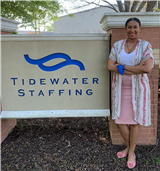 Chrystian Uzzle, Marketing Director, Tidewater Staffing
Chrystian Uzzle, Marketing Director, Tidewater Staffing
Let’s talk about PPE!
What is PPE? Personal protective equipment is anything you wear or use to protect yourself. Wear appropriate personal protective equipment (PPE) for your job to protect you and others from injury or illness. It can be something as simple as a hard hat in the construction industry, or it can be an entire hazmat suit used by firefighters. There are some jobs where you don’t need any PPE at all—but for those that do, it’s important to wear it correctly and consistently. How do I know what kind of PPE I need? If your job requires you to work with dangerous materials, chemicals, or heavy machinery, you should talk to your supervisor about getting appropriate training before beginning work on those tasks. If your job just involves lifting heavy objects, then maybe you don’t need special protection at all! But if you’re unsure about what kind of PPE to get, consult your supervisor or someone at human resources who can advise you on which types of protection will keep everyone safe while still being comfortable enough for long-term use.
If you think you’ve been injured while at work, notify your supervisor and seek medical attention immediately. It can be difficult to know when an injury is serious enough to take time off from work, but it’s important, to be honest with yourself and with your employer. Remember that the more information you can provide about your injury, the better equipped your employer will be to help you deal with the situation. If you are unable to work because of a workplace injury, it is important that you notify your employer immediately. Make sure that they have all of the necessary information regarding what happened and how it impacted your ability to perform your job duties. Not only will this help them understand why they need to pay for temporary disability benefits, but it will also help them ensure that other employees are not put at risk by performing tasks outside of their normal scope of responsibilities.
If safety is something that you value and embrace, remember that it doesn’t end in June. You can make continual strides in your life to improve your own personal safety, your family’s safety, and the well-being of everyone around you. Our hope is that we’ve offered some helpful tips here and that they’ve inspired you to continue to keep safety a priority. If your workplace is celebrating National Safety Month, call a safety meeting to set time aside just to discuss these topics and remind workers of their importance. If you have an employee who is struggling with a variety of different workplace hazards, be sure to offer them the resources they need to deal with these issues. And last but not least, spread the word on driving safety by sharing this article with everyone you know—their life may depend on it.
About the Author
Chrys Uzzle is a Social Media Wiz from Windsor, Virginia. She has a Bachelor's Degree in Industrial/Organizational Psychology from Radford University and wanted a career in human resources or studying the effects of workplace stress. She came to Tidewater Staffing last March as a Staffing Coordinator and then soared through the advancement pipeline to Sales Assistant and then ultimately to Marketing Director. In her spare time she is learning new yoga poses or studying new ways to use herbs as a healing aid.
"Putting people to work and giving people the opportunity to change their lives is what gets me up every morning."
« Return to Newsletter